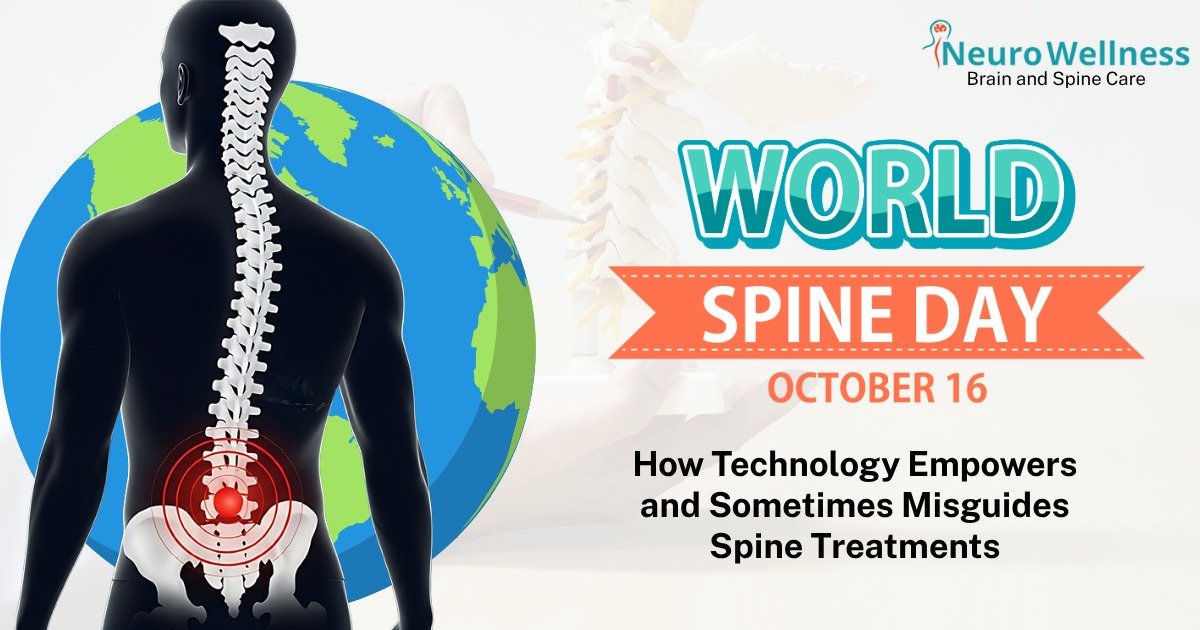World Spine Day is observed every year on October 16 to remind us how important it is to have a healthy spine. With robotics, navigation systems, and endoscopic equipment, spine surgery has reached a whole new level of precision in this age of modern technology. But there is one key thing to remember:
Technology is helpful, but judgment is what really heals.
As a neurosurgeon, I’ve seen both sides of this change how technology can bring people back to life and how relying too much on it can often cause unnecessary pain.

Dr. Ganesh Veerabhadraiah
Consultant – Neurosurgeon, Neurointerventional Surgery, Spine Surgeon (Neuro)
23+ Years Experience Overall (17+ years as Neuro Specialist)
Available for Consultation: Jayanagar 9th Block & Kauvery Hospital, Electronic City
1. Spine Problems: The Hidden Disease of Today
Back and neck discomfort have quietly become the most common reason working people visit doctors. The reasons differ, but the result is the same — less movement, sleepless nights, and poor productivity.
Common causes include:
- Sitting in front of a computer for long hours
• Poor posture while driving or lifting
• Being overweight and physically inactive
• Injuries or age-related degeneration
Common disorders include: Lumbar disc prolapse, cervical spondylosis, sciatica, spinal stenosis, infections, and spinal trauma. These issues no longer affect only the elderly — even those in their 30s and 40s are now facing spine difficulties due to modern work habits.
2. Technology in Spine Care: A Real Friend
Neurosurgeons now use advanced tools to diagnose and treat spine disorders in entirely new ways:
• High-Resolution MRI and CT Scans: Provide 3D clarity to identify nerve compression or disc damage.
• Intraoperative Navigation Systems: Work like GPS for surgeons, ensuring millimeter-level accuracy.
• Endoscopic Spine Surgery: Small-keyhole surgeries that allow faster recovery.
• Microsurgical Techniques and Neuro-Monitoring: Improve safety by protecting delicate nerves.
• Robotic Spine Systems: Enhance precision in screw placement and complex deformity corrections.
When used appropriately, these technologies help patients heal faster, reduce hospital stay, and regain mobility sooner than ever before.
3. Actual Experiences from My Practice
have seen patients come to the hospital in wheelchairs and stretchers, unable to walk or even sit and then leave within one to three days walking. It feels almost magical to witness such a transformation, where technology, skilled surgery, and timely intervention give individuals their lives back.
On the other hand, I’ve also encountered patients who developed complications after surgery elsewhere — sometimes due to poor case selection, incorrect technique, or implant issues. It doesn’t matter whether the surgery is open, minimally invasive, or robotic — every method has risks, and the outcome depends on the surgeon’s judgment and the patient’s healing.
It’s not how modern or fancy the technology is that matters — it’s how wisely it’s used.
4. The Risk of Decisions Based on Technology
Today, advertisements and social media often make some spine surgeries sound like miracle cures — “laser surgery,” “keyhole,” or “robotic” being popular buzzwords. But no single technology fits everyone. Every spine condition is different, and each patient should receive treatment tailored to their specific problem — not just based on the latest gadget.
When choices are made to promote technology rather than address the real cause, it leads to over-treatment and disappointment.
Your spine needs knowledge, not advertising.
5. What You Need to Know Before Having Spine Surgery
Before you agree to any spine surgery, make sure you clearly understand the following:
1. Know exactly what your diagnosis is
Ask your doctor: What is causing my pain? Which nerve or disc is involved?
2. Is surgery really needed?
Most spine disorders (up to 80%) improve with rest, medication, posture correction, and physiotherapy. Surgery is required only when pain is constant, there’s nerve compression, or conservative treatments have failed.
3. Know what kind of surgery it is
Each form — endoscopic, microscopic, or fusion — has its role. Ask why it’s chosen and what alternatives exist.
4. Discuss recovery and rehabilitation
Ask about possible complications, hospital stay, and physiotherapy time.
5. Choose skill over tools
An experienced and honest neurosurgeon always puts patient needs above equipment.
6. Useful Advice for Workers and Drivers
For Drivers:
Long-distance drivers often suffer back issues due to vibration, poor posture, and lack of movement.
• Adjust your seat to support the lower back.
• After every 2–3 hours of driving, take a 5-minute walk or stretch.
• Avoid keeping your wallet in your back pocket while sitting.
• Do gentle back and neck stretches daily.
• Stay hydrated and avoid sitting continuously for more than 3 hours.
For Industrial Workers and Labourers:
Many spine injuries occur due to improper lifting or sudden twisting movements.
• Lift with your knees bent, not your waist.
• Use team lifting for heavy loads.
• Avoid jerky twisting motions.
• Strengthen back and core muscles through regular exercise.
• Use support belts or braces only under medical supervision.
• Report early if you feel tingling or weakness — delaying treatment worsens nerve compression.
7. When Technology and Experience Come Together
When guided by skill and empathy, technology becomes life-changing. In my practice, using microscopic and endoscopic techniques wisely has helped many patients return to normal life within days. But it’s not the camera or robot that heals — it’s the understanding of anatomy, precision, and patient-centered judgment that truly makes a difference.
8. A Balanced Way to Keep Your Spine Healthy
Modern medicine works best when technology, knowledge, and ethics work together. At NeuroWellness India, we believe spine care should never be decided by machines it should be personalized, transparent, and evidence-based.
9. It’s Always Better to Prevent Than to Operate
Whether you work at a desk or lift heavy objects, remember to:
• Keep your posture upright
• Strengthen your core muscles
• Stay active and stretch every day
• Maintain a healthy body weight
• Sleep on a firm, supportive mattress
10. The Last Word: Your Spine Is Your Lifeline
Your spine supports your entire body — protect it.
Technology is a blessing when used wisely, but it’s only as effective as the surgeon who applies it.
I have seen patients leave the hospital smiling after major spine surgeries — and others suffer from wrong treatments.
So my advice is simple:
Trust knowledge, not gadgets. Learn before you agree. Let science — not marketing — guide your spine decisions.
This World Spine Day, let’s promise to care for our spine the way it cares for us quietly, tirelessly, and every single day.
Your Spine Deserves Expert Hands
This World Spine Day, take charge of your spinal health.
If you’re facing chronic back pain, disc problems, or considering spine surgery, trust the specialists who balance technology with human expertise.
Book Your Consultation with Dr. Ganesh Veerabhadraiah — Senior Neurosurgeon, Neurowellness Bangalore.

About Author
Dr. Ganesh Veerabhadraiah
Dr. Ganesh Veerabhadraiah, leading neurosurgeon and neurologist in Bangalore, has over 20 years of expertise in managing back pain, migraines, headaches, neuro disorders, and spine problems. His clinical excellence and patient-first approach make him one of the most trusted neuro doctors in Bangalore.
At Neurowellness Brain & Spine Clinic in Jayanagar and Kavery Hospital Electronic City, Dr. Ganesh provides comprehensive treatments ranging from minimally invasive spine surgery to advanced neurological care. As a respected back pain specialist and migraine doctor, he continues to deliver reliable outcomes for patients.
👉 Connect with Dr. Ganesh on LinkedIn




